We recognize that this can be a challenging and stressful time if you are suffering with debt and are thinking about declaring bankruptcy.
Working with a bankruptcy attorney who can lead you through the process and uphold your rights is crucial if you want to safeguard your rights and understand your alternatives and the effects of each decision. In this blog, we’ll discuss the various bankruptcy options to consider, as well as their prerequisites.
After reading this, we hope that you will reach out to a bankruptcy attorney who can offer the assistance and direction you require so that you don’t have to go through this trying period by yourself.
Understanding Bankruptcy

Filing for bankruptcy is a serious decision that can have significant consequences on your future. It’s critical to know your options and the potential outcome of each decision involved.
A successful bankruptcy can offer a much-needed second chance and a path out of debt, but you need to be aware of the potential effects that bankruptcy has on your credit score and personal liability.
Bankruptcy Process in Brief
Bankruptcy is a legal process that allows individuals or businesses to either eliminate or repay their debts under the protection of the bankruptcy court. The purpose of bankruptcy is to provide debt relief to individuals or businesses that are unable to pay their debts and to allow them to make a fresh start.
Both individuals and corporations must adhere to the US federal bankruptcy code regulations while declaring bankruptcy.
To start, they must fill out a bankruptcy petition and disclose all relevant financial data, such as their debts, assets, and sources of income. A bankruptcy trustee is then appointed to oversee the proceedings, which are within the jurisdiction of the bankruptcy court.
In addition, bankruptcy petitioners are required to appear in person at a creditors’ meeting where they will be questioned about their finances by the bankruptcy trustee and any other creditors who might be interested in the case.
If the bankruptcy case is authorized, the person or corporation will receive a bankruptcy discharge, meaning that their debts will be forgiven or reformed in accordance with the bankruptcy plan’s provisions.
Bankruptcy Types
Chapter 7 and Chapter 13 bankruptcy are the two primary types of bankruptcy for people.
Chapter 7 Bankruptcy
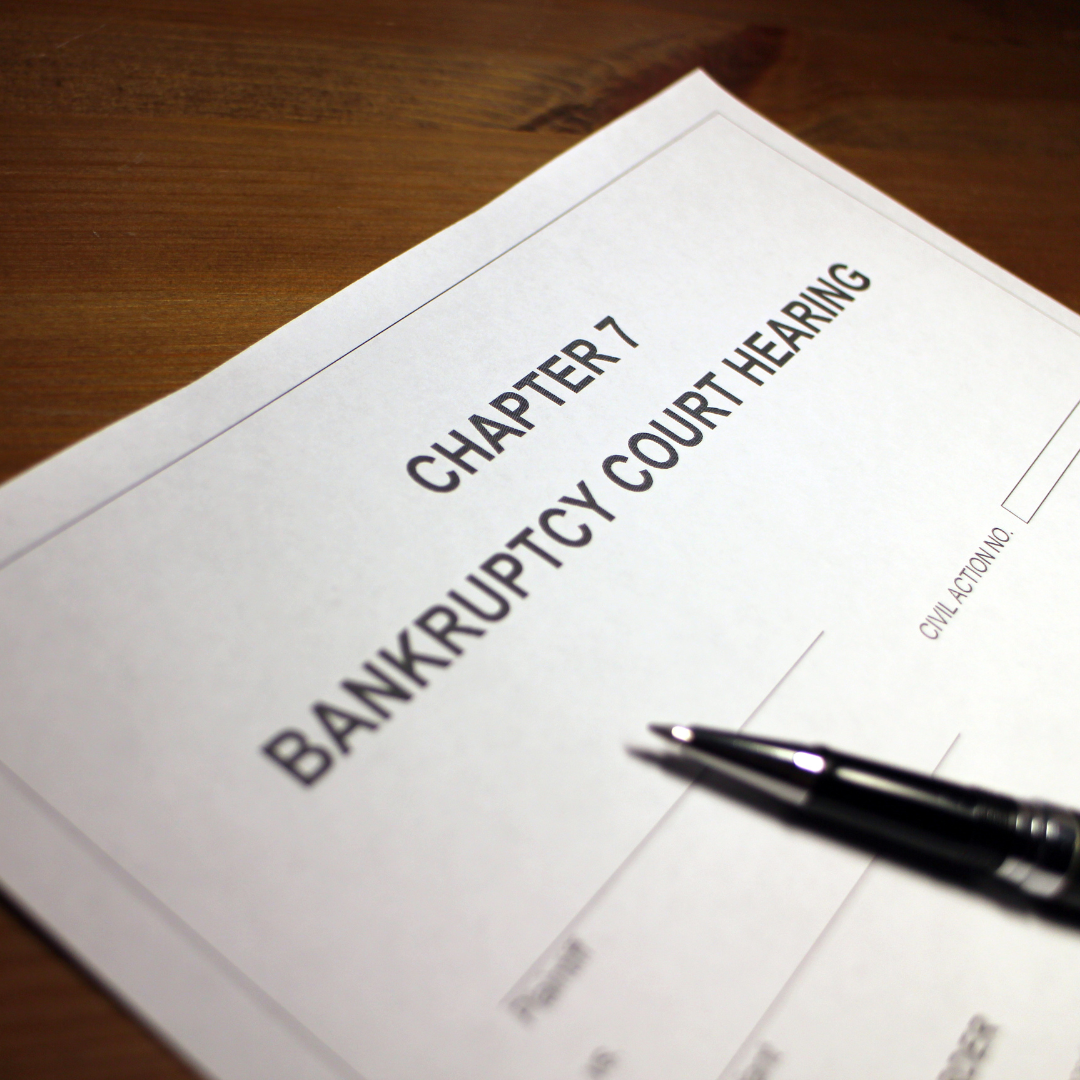
Chapter 7 bankruptcy is often referred to as “straight bankruptcy” and is designed for individuals who have a significant amount of unsecured debt, such as credit card debt or medical bills. It calls for the liquidation of non-exempt assets in order to settle unsecured debts. After liquidating the assets to pay creditors, the remaining debt is discharged.
However, not all assets are subject to liquidation. Some assets, such as a primary residence, may be exempt from liquidation. In addition, some debts may not be dischargeable in Chapter 7 bankruptcy, such as child support or tax debts.
Chapter 13 Bankruptcy
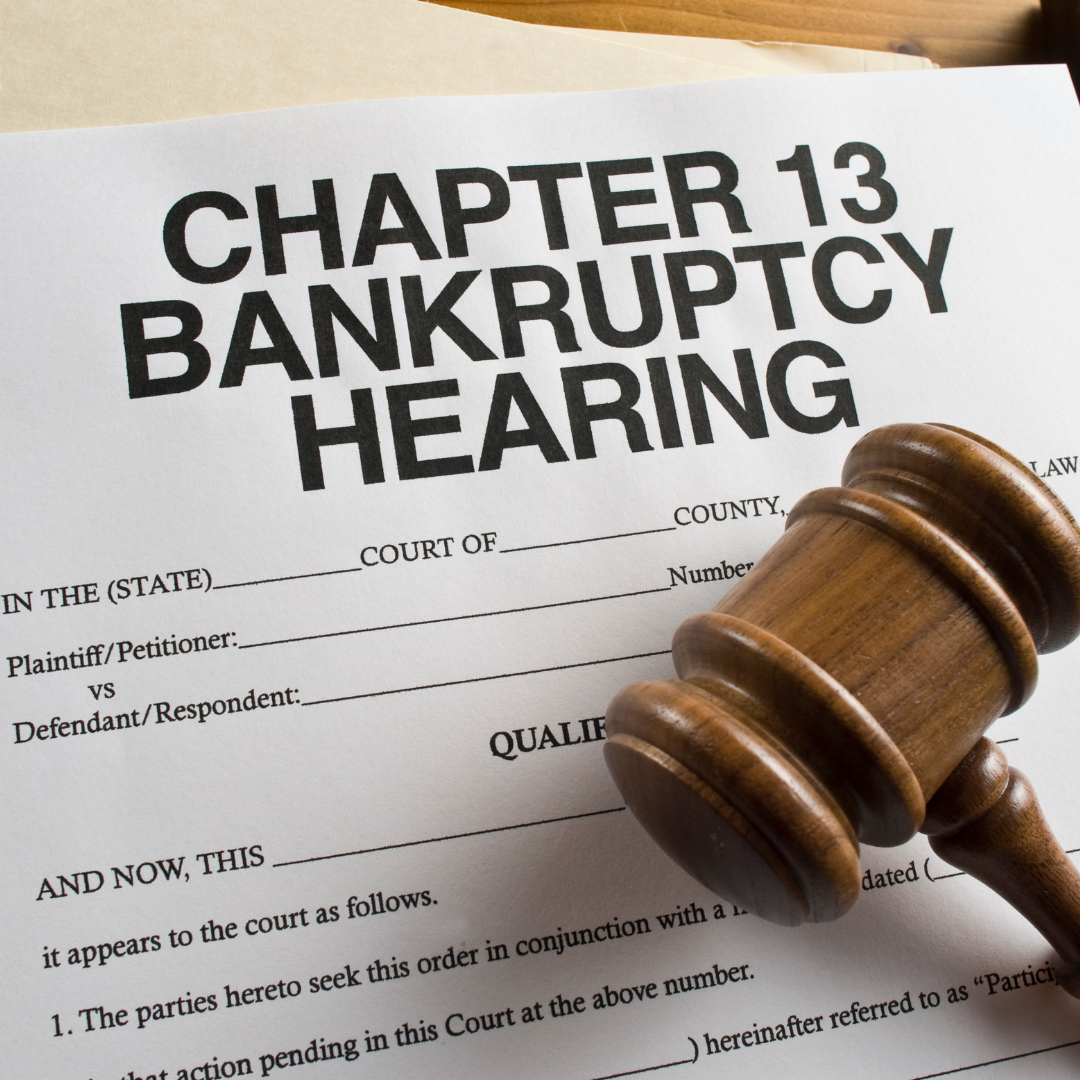
Chapter 13 bankruptcy is a reorganization bankruptcy that is designed for individuals with a regular income who are struggling to pay their debts. In a Chapter 13 bankruptcy case, the debtor proposes a repayment plan to pay off their obligations.
The repayment plan is based on the debtor’s income and expenses, and must be approved by the bankruptcy court. This typically includes a single monthly payment for three to five years to a trustee who will use it to repay the creditors. Once the repayment plan is completed, any remaining eligible debts may be discharged.
One advantage of Chapter 13 bankruptcy is that it allows debtors to keep their assets, such as a home or car, while still repaying their debts. In addition, some debts that are not dischargeable in Chapter 7 bankruptcy, such as certain tax debts or student loans, may be included in the repayment plan in Chapter 13 bankruptcy.
In summary, Chapter 7 and Chapter 13 bankruptcy are two different options for individuals who are struggling with debt. Understanding the differences between these two types of bankruptcy can help you make an informed decision about which option is best for your unique financial situation. Contact LSS Law to schedule a no-cost bankruptcy strategy session and learn more about your options.
Qualification for Bankruptcy

Individuals must fall within specified income and debt thresholds to qualify for bankruptcy. The state where the person resides and the type of bankruptcy being filed both affect these limits.
An experienced bankruptcy attorney will help you find out if you qualify to file for bankruptcy and which type of bankruptcy is best for your circumstances. Don’t let debt rule your life any longer; speak with a bankruptcy attorney who can provide you with the help and direction you need to consider all of your options.
Getting Ready for Bankruptcy

You’ll need to gather all of your financial records and study your budget before filing for bankruptcy in order to fully understand your financial condition. You’ll need an accounting of debts, both secured debts and unsecured debts. Do not forget to include business debts, personal loans, or cash advances.
Getting Financial Documents Together
The bankruptcy process begins with gathering financial records. Bills, tax returns, pay stubs, and any other financial records that might be pertinent to your bankruptcy case are included in this. To guarantee that your bankruptcy case is handled properly, it’s important to have precise and complete financial information. These documents should include any assets or investments that may be pertinent to your case.
Keep track of all debt payments and income in the months leading up to filing. This will create a transparent accounting of all your financial transactions and help you avoid any allegations of fraudulent conveyance, or an unfair transfer of assets before your filing.
Having organized and accurate financial documents will make the process of filing for bankruptcy easier and more efficient. It is also helpful to consult a bankruptcy attorney when preparing your financial records for submission. An experienced attorney can provide valuable guidance about what documents are needed and how best to present them for maximum benefit.
Going Over Your Budget
Reviewing your budget is an important step in the bankruptcy process. You’ll need to closely examine your earnings, expenses, and debts in order to fully understand your financial situation.
By analyzing your budget, you might find areas where you can make changes that will improve your financial status. This could mean taking on more work or employing other strategies to reduce costs or increase income.
If you are filing for a Chapter 13 bankruptcy, then you will use this budget to submit a proposed repayment plan to the court. This repayment plan should take into account your income and expenses, as well as the amount of money you are able to affordably repay. The court will review this repayment plan and determine if it is fair and reasonable before approving it. Once approved, it becomes legally binding and all parties involved must comply with its terms in order for the bankruptcy process to move forward.
As an aside, before choosing bankruptcy, you can try to reach out to your creditors to see if your payments to them can be restructured to meet your budget. You might try to negotiate a settlement or debt consolidation instead of filing for bankruptcy. Schedule a free Strategy Session with LSS Law so that we can explain your options before deciding whether bankruptcy is the best choice.
How to Choose a Bankruptcy Attorney

To successfully navigate the bankruptcy process and make sure your rights are upheld, working with a bankruptcy attorney can be useful. Experience, reputation, and attorney-client connection are a few things to take into account when selecting a bankruptcy lawyer.
Considering Prospective Attorneys

To select a lawyer that is knowledgeable and skilled in managing bankruptcy matters, do your homework. To do this, you might check online reviews, consult friends and family for recommendations, or seek advice from regional legal groups. The lawyer that you choose will have a significant impact on your future.
Scheduling Your Consultation
Once you’ve narrowed down your list of potential bankruptcy lawyers, set up appointments with them so you can learn more about what they have to offer and gauge how well they work with clients.
You can explain your unique situation and any worries you may have during the consultation, as well as ask questions regarding the attorney’s background, method of handling bankruptcy cases, and success rate.
Filing Bankruptcy
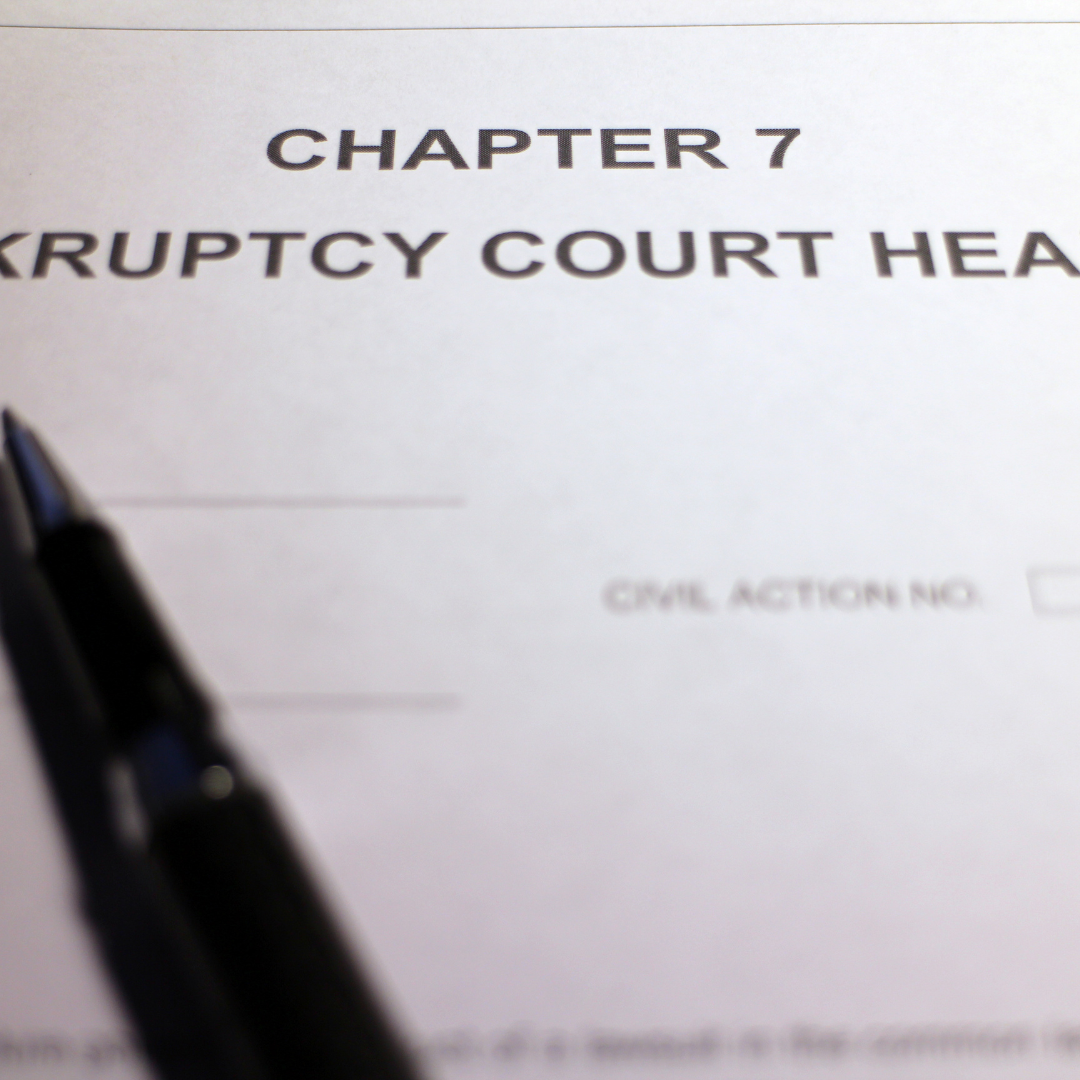
Several steps are involved in the bankruptcy process, including filling out bankruptcy forms, attending a creditors’ meeting, and receiving a discharge.
Filling Out Bankruptcy Forms
To file for bankruptcy, you will need to fill out a number of forms that detail your financial situation.
This may include details about your earnings, expenses, debts, and assets. To ensure that your bankruptcy case is handled properly, it is critical that you fill out these forms accurately, completely, and in time to meet the deadline.
Attending the Meeting of Creditors
After filing for bankruptcy, you will be required to attend a creditors’ meeting. Attending a creditors’ meeting is an important step in the bankruptcy process.
Your assigned bankruptcy trustee and any creditors who may have an interest in your case can question you about your finances at the meeting. You should bring copies of all relevant documentation to the creditors’ meeting, such as tax returns, pay stubs, and bank account statements. Doing so will help you provide accurate and complete answers to any questions that may arise during the session.
Obtaining a Discharge
If your bankruptcy case is approved, you will be granted a discharge. This means that your debts will be wiped out or restructured in accordance with the terms of your bankruptcy plan. The discharge is a permanent order that prohibits the creditors from taking any form of collection action and stops all communication with the debtor.
Considerations Before Filing for Bankruptcy
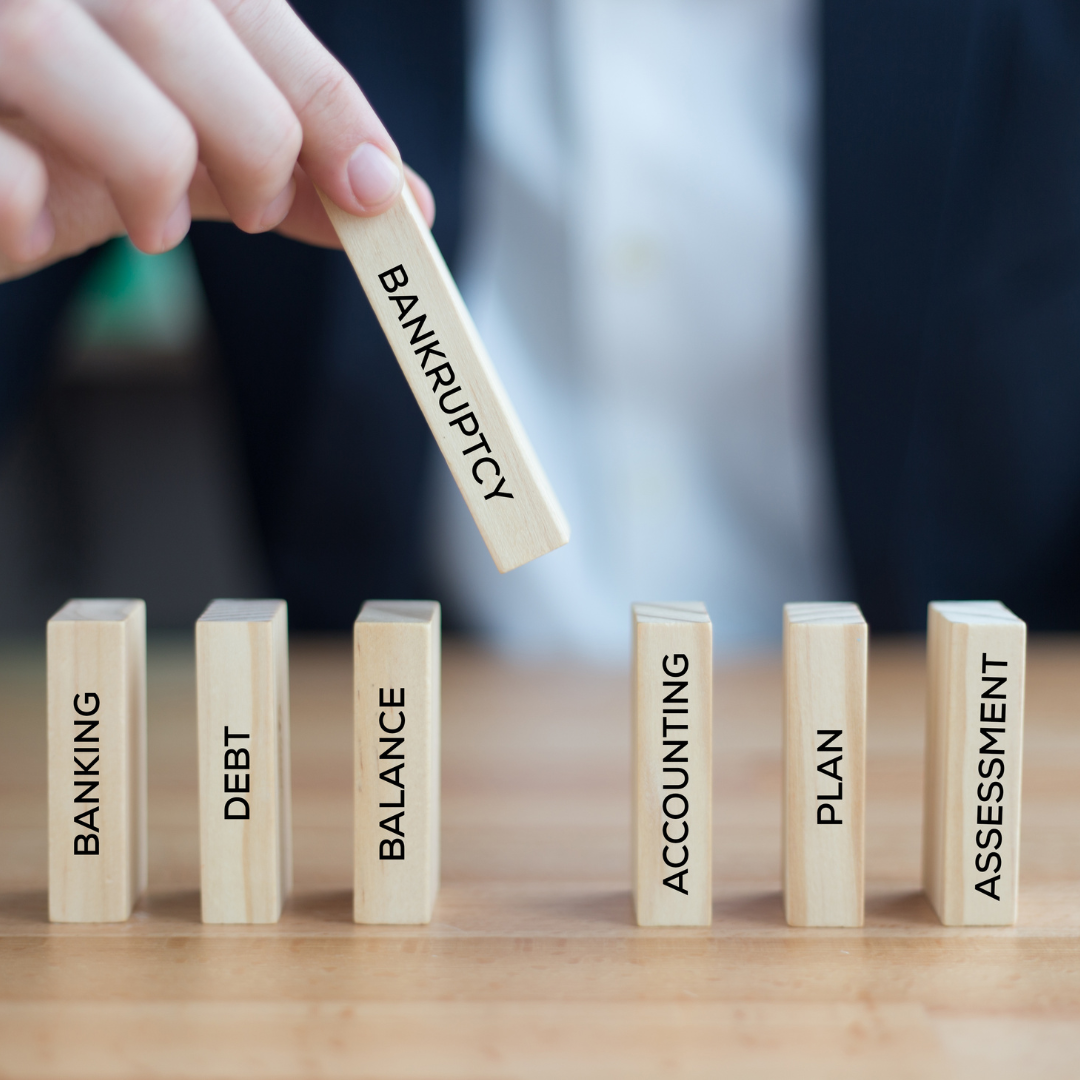
Before filing bankruptcy, you should think about how it will affect your credit score and personal liability. Bankruptcy can have a significant impact on your credit score and your future ability to obtain credit.
It is critical to carefully consider your options and work with a bankruptcy attorney who can help you understand the implications of each decision and protect your rights.
Contact LSS Law for a No-Cost Bankruptcy Consultation
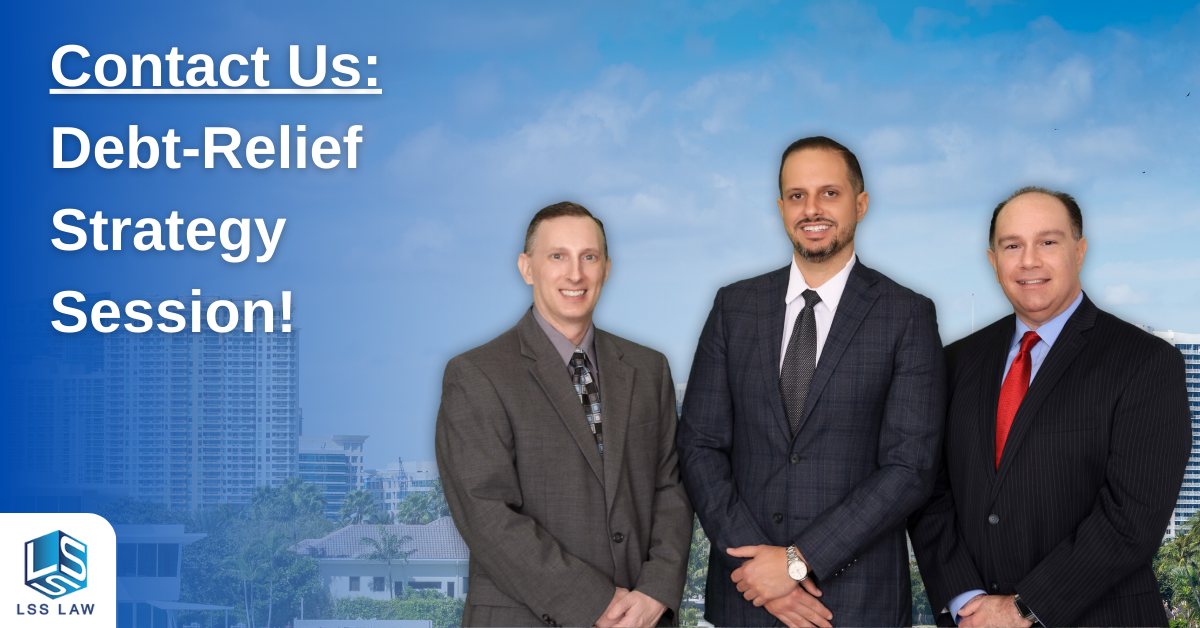
If you are struggling with serious debt and are considering bankruptcy as a way to get a fresh start, it is important to understand your options and to work with a qualified and experienced bankruptcy attorney. At LSS Law, we understand that this can be a difficult and overwhelming time, and we are here to provide the support and guidance you need to explore your options and determine the best course of action for your situation.
To help you understand your options, LSS Law offers a no-cost Strategy Session with one of our experienced bankruptcy attorneys.
During this session, you will have the opportunity to discuss your financial situation, review your debt relief options, and ask any questions you may have about the bankruptcy process.
Our attorneys are experts in Florida bankruptcy laws and will provide the personalized guidance you need to make informed decisions about your financial future.
To schedule your no-cost Strategy Session with LSS Law, simply give us a call at 954-466-0541 or visit our website at LSS.law.
Don’t let debt control your life any longer – contact LSS Law today to take the first step toward the refreshing start that you desire.
Common Questions about Bankruptcy – When to File for Bankruptcies

When considering bankruptcy, people have many questions, and it is critical to have all of the information you need to make informed decisions about your financial future. People frequently ask the following questions when contemplating bankruptcy:
Is it possible to keep my house or car after my bankruptcy filing?
If you file for bankruptcy, you may be able to keep your house or car, but it will depend on the type of bankruptcy you file and the value of your assets.
In Chapter 13 bankruptcy, you may be able to keep your house or car by reorganizing your debts and adhering to a repayment plan for a period of 3 to 5 years. However non-exempt assets will be sold in Chapter 7 bankruptcy to pay off unsecured debts such as credit card debts or medical bills. If the value of your home or car is exempt, you may be able to keep these assets.
It is critical to speak with a bankruptcy attorney to understand your options and determine whether you can keep your home or car if you file for bankruptcy.
If I declare bankruptcy, will I lose all of my assets?
If you file for bankruptcy, you will not necessarily lose all of your assets. Some assets, such as retirement accounts and personal possessions, may be exempt from bankruptcy.
Exemptions differ from state to state, so it is critical to consult with a bankruptcy attorney to determine which assets may be protected in your state. You may be able to keep certain assets by repaying debts secured by those assets, such as a mortgage or car loan.
How long does it take to file for bankruptcy?
The length of your bankruptcy process will be determined by the type of bankruptcy you file and the complexity of your case. Chapter 7 bankruptcy can be completed in a matter of months, whereas Chapter 13 bankruptcy can take 3 to 5 years.
Completing bankruptcy forms, attending a creditors’ meeting, and receiving a discharge of your debts are all part of the bankruptcy process. Work with a bankruptcy attorney to understand the timeline for your case and to ensure that you complete all of the necessary steps.
Does bankruptcy discharge student loan debt?
Most of the time it does not. But, the ability to discharge student loan debt is dependent on the specifics of your case and circumstances.
And, because these details change so frequently, it is best to schedule a no-cost consultation with LSS Law so we can give your case the attention it deserves and provide you with a more detailed report on how to deal with your student loan debt.
How do I qualify for bankruptcy?
To be eligible for bankruptcy, you must meet certain income and debt limits outlined in the federal bankruptcy code.
A means test, which compares your income to the median income for your state and household size, is one way to determine if you meet these limits. If your income is lower than the median, you may be eligible for Chapter 7, which involves the liquidation of non-exempt assets to pay off unsecured debts. If your income is higher than the median, you may still be eligible for Chapter 13 bankruptcy, which involves debt reorganization and the development of a repayment plan to pay off debts over a three to five-year period.
It is critical to consult with a bankruptcy attorney to determine if you meet the eligibility requirements and to discuss which type of bankruptcy may be appropriate for your circumstances.






